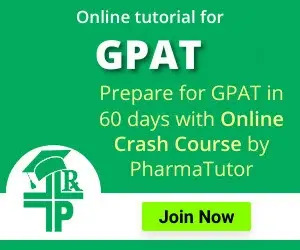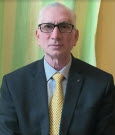 ABOUT AUTHOR
ABOUT AUTHOR
Dr. R. S. Thakur
Chief Editor, Journal of Pharmaceutical Research
Krupanidhi College of Pharmacy, Bengaluru, India.
Email : drramsthakur@gmail.com
Preamble
On 28th March, 2023 Government of India, Ministry of Health and Family Welfare has constituted an Expert Committee of 16 persons including the Chairman, vide Office Order F No.Z-28020/27/2023-AHS, FTS No. 8205489. The terms of Reference of the Expert committee are:-
(a) To review Pharmacy Education;
(b) To review the Pharmacy Act, 1948; and
(c) To make recommendations for restructuring of the Pharmacy Council of India.
This is the most welcome step taken by the Central Government in the interest of health and happiness of global society in view of the fact that India has established itself as Pharmacy of the World. This is no mean achievement, however, the task ahead is not only arduous but also a precarious journey lies ahead to further strengthen and maintain this achievement. In that direction, it must be appreciated that human resource development in pharmaceutical sciences and technology deserves special attention and the nation is grateful to the Central government for the timely action to revamp not only pharmacy education but also the law governing it and the authority regulating the education.
Reference Id: PHARMATUTOR-ART-3004
Historical facts
Pharmacy education in India was designed in light of the recommendations of the Drugs Enquiry Committee report 1930-1931[1] as depicted below:-

Taking the above recommendation seriously Prof. M. L. Schroff quickly designed and started a B. Sc. course with Pharmaceutical Chemistry as special subject at Benares Hindu University in 1932. This was in real sense the beginning of organized pharmaceutical education at University level in this country; by establishing Pharmaceutical Chemistry section. In 1934 the course was improved and designated B. Sc. (Pharmaceutical Chemistry). A photograph of this batch taken in 1936 along with Prof. M. L. Schroff is appended below to place on record a glimpse of the historic moment.
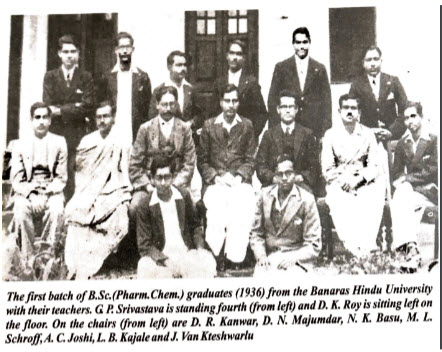
In 1936 there was further improvement in course content and it was rechristened B. Pharm. It may be worth mentioning here that the University of London had started B. Pharm. course in 1925. [2] The two periodic revision of the course after 2 years interval signified up gradation to produce competent manpower for the nascent pharmaceutical industry of India.
The Pharmacy Act, 1948 was solely designed on the basis of specific recommendations of the Drugs Enquiry Committee report’s paragraphs 399 to 402 and 429 to 446 contained in Section VII Chapter II of the report from page nos. 158-159 and 164-167. The recommendations of the Drugs Enquiry committee were based on the detailed response the committee received in the filled questionnaire containing 38 questions in 4 parts for expert groups, trade and lay public, and specific representations and personal evidences gathered by the commission during visits of Madras, Bangalore, Vizagapatnam, Benares, Ghazipur, Lucknow, Dehra Dun, Meerut, Agra, Cawnpore, Allahabad, Amritsar, Rawalpindi, Lahore, Calcutta, Dacca, Peshawar, Patna, Nagpur, Jabbalpore, Bombay, Poona, Ahmadabad, Karachi and Delhi during 17th October 1930 to 31st January, 1931.
It is pertinent to mention here that during 1930-31 the fifth edition of the British Pharmacopoeia (B. P. 1914) was official throughout the British Empire including British India. It was the era of extracts, infusions, powders, solutions, syrups, tinctures and spirits. Therefore, the background of the Pharmacy Act, 1948 is the nature of the drugs available in B. P. 1914.
In those days synthetic drugs were few and far between, prescribing dosage regimen for extemporaneous compounding and dispensing for individual patient was the order of the day and in nut shell practice of pharmacy reverberated around mortar and pestle the world around, as evident from the detailed status of pharmacy profession recorded by the Drugs Enquiry Committee for Great Britain,
America, Canada, and New Zealand, in paragraphs 113 to118 on page nos. 46 to 48 of the report.
Moreover, B. P. 1914 for the first time included aspirin (first synthetic pharmaceutical) [3], barbitone, heroin and chloral, amongst others as can be seen in the depiction below:-
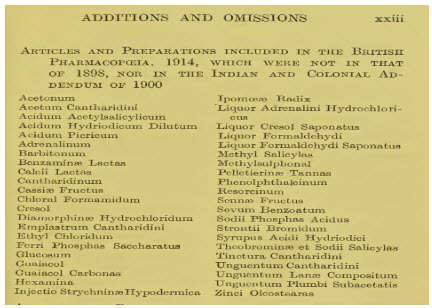
It also included such items in the Indian and Colonial Addendum that had stood the test of time and hence a wide range of drugs of Indian origin, was considered as suitable for the whole British Empire.
The monograph of Acetylsalicylic Acid (Aspirin) as appeared in B. P. 1914 is presented below to compare the systematic advancement relating to standards of drugs.
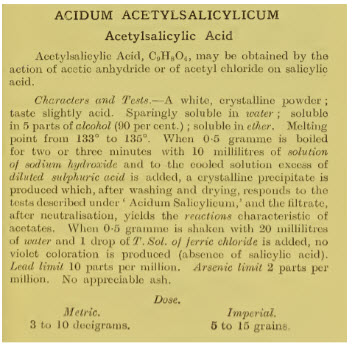
The sixth Edition of British Pharmacopoeia was published only in the latter part of 1932. [4] Its salient features are depicted below:-
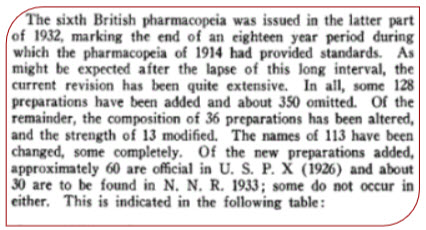
The basic idea behind the above historical background is to demonstrate that since then pharmaceutical sciences and technology have advanced by leaps and bounds and it is one of the fasted growing technology aimed at fulfilling the lofty goal of ‘Health for all’.
Pharmacy Bill
The Pharmacy Bill, 1945 to regulate the profession of Pharmacy was published for general information vide Notification No. F-450144/45-H (1) dated 27th November 1945. It was introduced in the Legislative Assembly vide L.A. Bill No. 52 of 1947 as published.[5] The Statement of objects and reasons of the Pharmacy Bill as published in the aforesaid Gazette of India, on page 469 is reproduced below:
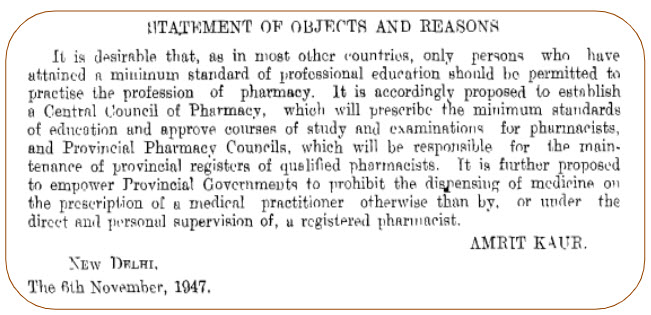
There are three objectives enshrined in the above statement of objects and reasons:
(i) prescribe the minimum standards of education for pharmacists by the Central council;
(ii) maintenance of provincial register of qualified pharmacists by the Provincial/State Councils; and
(iii) prohibit the dispensing of medicines otherwise than by registered pharmacist by the State Government and State council.
That the first, foremost, prime and cherished goal of the Act was aimed at permitting only such persons who have attained a minimum standard of professional education to practice the profession of pharmacy.
As regards the ambit of practice of the profession of pharmacy, Section 42 of the Act explains it in definite terms. The said section 42 is reproduced below for ready reference:-
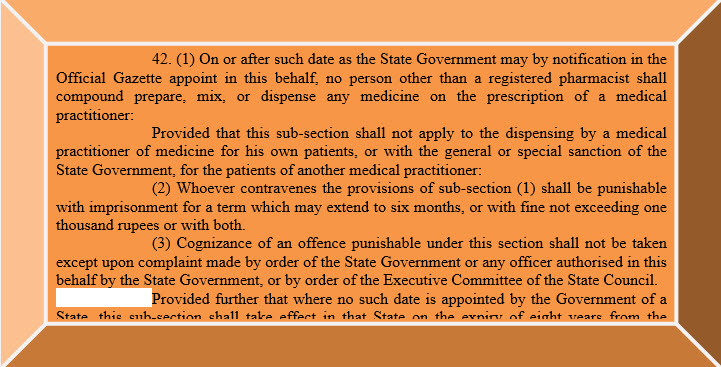
The Renaissance
Consequent upon the finalization of National Education Policy 2020(NEP), which is based on the principle that education must develop not only cognitive capacities but also social, ethical, and emotional capacities and dispositions; the author felt the need to evolve a pragmatic, futuristic pharmaceutical education policy with visionary inputs that could transform the teaching learning process and respond to expectations of the state of the art advanced pharmaceutical care. Producing empowered professionals, fully equipped with latest knowledge, skills, technologies and professional practice etiquette is a gigantic task. The vast canvas of complexities of pharmaceutical education deserves skilful navigation to discover transformational policies for educational reform. In view of the NEP’s emphasis on forward-looking vision for India’s higher education system and advocacy for catalyzing quality academic research in all fields through a new National Research Foundation, the pharmaceutical education arena needs special initiatives to produce world class pharmacists and pharmaceutical technologists to consolidate India’s position as Pharmacy of the World.
It is in this context that the distinguishing features of pharmaceutical education must accommodate dynamic system for knowledge generation, dissemination, advancement and utilization for welfare of the society and the nation as a whole. Rational use of medicines, economical availability and accessibility to quality medicines and safeguarding public health from the risks/hazards posed by improper use or misuse of modern medicines deserves special attention. No other healthcare professional fits well in this gigantic task. This deserves appropriate consideration in view of the Statement of Object and Reasons of Pharmacy Act, 1948. Appropriate curricular approach, closely monitored pedagogical performance assessment, and foolproof evaluation system are backbone of sound education system. Education must help individuals to explore their best potential and thrive in their professional performance.
In light of the above background on December 3, 2021 the author initiated a move for appointment of a Commission for Pharmaceutical Education, comprising of Community Pharmacist, Hospital Pharmacist, and representatives from Pharmaceutical industry, Drug Testing Laboratories, and Pharmaceutical Journal/allied field with following terms of reference:
“1. Current status of and trends in health care sector vis-a-vis role of pharmacist in global perspective of providing world class pharmaceutical care;
2. Assessment of future needs in pharmaceutical education vis-a-vis emerging role of pharmacist in the context of India emerging as Pharmacy of the World;
3. Devising mechanism for advancing a continuous process of curriculum development, teaching and learning vis-à-vis National Education policy 2020;
4. The role of experiential learning (internship), and practitioner education in professional and technical education; and
5. Visualizing impact of the Commission’s recommendations in view of first such initiative of 21st century for total quality management and dynamic skill accumulation model of continuous changes in Pharmaceutical Education and research initiatives at various levels.”
This was followed by a publication [6] to raise awareness among the professionals for the furtherance of the initiative. However, as usual it failed to evoke any response, debate, suggestion or comment from any quarter. Days passed by.
The Pragmatic Step
No doubt, the Government of the land, which is credited with reaching India to Pharmacy of the world fame, has come forward on its own to not only update pharmacy education but also the law and the regulatory authority too in one stroke. This is quite commendable. The pharmacists’ fraternity must gear up to avail full benefits of the opportunity offered by the Central Government.
The Way Forward
Now it is the turn of the enlightened pharmacists’ fraternity to put forth their suggestions on all the three terms of reference, before the expert committee along with justification and scheme of implementation. The suggestions should cover educational reforms that are imminent; practice scenario and enlargement of scope to achieve global standards; and efficient monitoring system to assure quality of both education and services.
There is no denial to the fact that India is pharmacy of the world and therefore, Pharmacy Act of India too must be the best Act of world. At every forum pharmacy services of USA and UK are lauded and exemplified as the ideal one.
It is in that context that Pharmacy Act of India must be parallel to Acts of USA and UK.
In author’s considered opinion nothing less than that should be acceptable to India.
Whatever those laws provide to ensure quality pharmaceutical education and services, India too deserves that. The pharmacists’ fraternity should plan accordingly to submit memorandum to the Expert Committee.
References
[1]. Report of the Drugs Enquiry Committee, 1930-31. Printed by The Superintendent, Government Press and Published by The Government of India, Central Publication Branch, Calcutta. Page 169.
[2]. Prof. Harkishan Singh. A Place of Pilgrimage for Pharmacists. The Pharma Review. Special Feature -59th IPC. 2007: 1-8.
[3]. R. S. Thakur. The First Synthetic Drug. Pharma Times, Vol. 48; No. 04 (April, 2016): p 18.
[4]. The British Pharmacopoeia 1932. JAMA. 1933;100(14):1134. doi:10.1001/jama.1933.02740140058035 Available at https://jamanetwork.com/journals/jama/article-abstract/242518 Accessed on 19-04-2023.
[5]. The Gazette of India, November 29, 1947, Pt. V, p456-469.
[6]. R. S. Thakur. Pharmaceutical Education Policy. Pharmatutor. 7th December, 2021. https://www.pharmatutor.org/articles/pharmaceutical-education-policy












.png)

